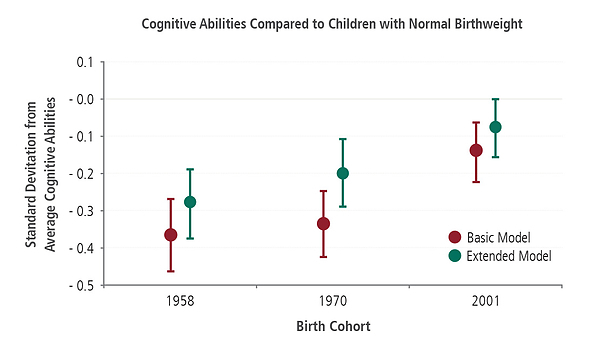May 30, 2017 | News
Better prospects for small babies

Cognitive disadvantages from low birth weight have become much smaller. © marshy / photocase.com
Parents of children with low birth weight may fear that their children may face disadvantages later in life. Indeed, many studies have shown that the cognitive development of low birth weight children (defined as having less than 2500g at birth) is worse than that of their normal birth weight peers. A new study from Rostock now shows that this disadvantage experienced by low birth weight babies has shrunk significantly over the past decades.
The following text is based on the original article Decline in the negative association between low birth weight and cognitive ability, by MPIDR director Mikko Myrskylä and has with minor changes also been published in the issue 1/2017 of the demographic quarterly Demografische Forschung Aus Erster Hand.)
Low birth weight babies have worse cognitive development than those with normal birth weight. In Great Britain, for babies born in the 1950s-1970s the difference in cognitive scores at ages 10-11 between normal birth weight and low birth weight children was as large as one third of a standard deviation, corresponding roughly to 5 points on a standard IQ scale. However, this disadvantage shrunk in the second half of the 20th century, being now only approximately one tenth of a standard deviation.
The study, conducted by Mikko Myrskylä, Max Planck Institute for Demographic Research, and Alice Goisis and Berkay Özcan, both of the London School of Economics and Political Science, was based on three large birth cohort surveys conducted in Great Britain. In the scientific journal Proceedings of the National Academy of Science (PNAS), the researchers describe how the situation for low birth weight babies has improved: slightly so from 1958 to 1970 and markedly so until 2001 (see Fig. 1).

Fig. 1: Significant reduction in cognitive disadvantages: The baseline model accounts for first birth and sex of the child. The extended model also controls for maternal socio-cultural characteristics included in the calculations.
The study shows that low birth weight children were more likely to have come from disadvantaged families. Girls, first-born kids, and children from families in which the mothers had poor health behavior during pregnancy were more likely to be underweight at birth.
Adjustment for these and other details provided in the three surveys, such as the age of the mother at childbirth, her level of education, her social status, and family characteristic did not change the result significantly: Low birth weight children that were born in 1958 or 1970 scored significantly lower in the cognitive ability tests than same-aged children of normal birth weight. In the 2001 cohort, the differences in cognitive skills were much less pronounced, although they still existed.
The decline in the disadvantage of low birth weight children is partially surprising because the more recent birth cohorts (2000-2002) had a higher proportion of babies born very underweight, thus they had especially poor starting conditions. The percentage of babies weighing less than 1500 g at birth rose from 0.1 percent in 1958 to 0.7 percent in the 2001 birth cohort. On the whole, it can be assumed that only the healthiest and most resilient of the low birth weight children born in 1958 survived, whereas in the 2001 birth cohort a much larger fraction of the very low birth weight babies survived. Despite this selection effect, which implies that there are more very small weight babies in the 2001 birth cohort, they showed the smallest cognitive disadvantage. It is likely that the gradual improvement of postnatal medical care for low birth weight babies is the key to understanding the decline in the disadvantage, the authors write.
More Information
-
Goisis, A., B. Özcan, M. Myrskylä: Decline in the negative association between low birth weight and cognitive ability. Proceedings of the National Academy of Sciences of the United States of America (PNAS), 114(2107)1, 84-88. DOI: 10.1073/pnas.1605544114
-
www.demografische-forschung.org